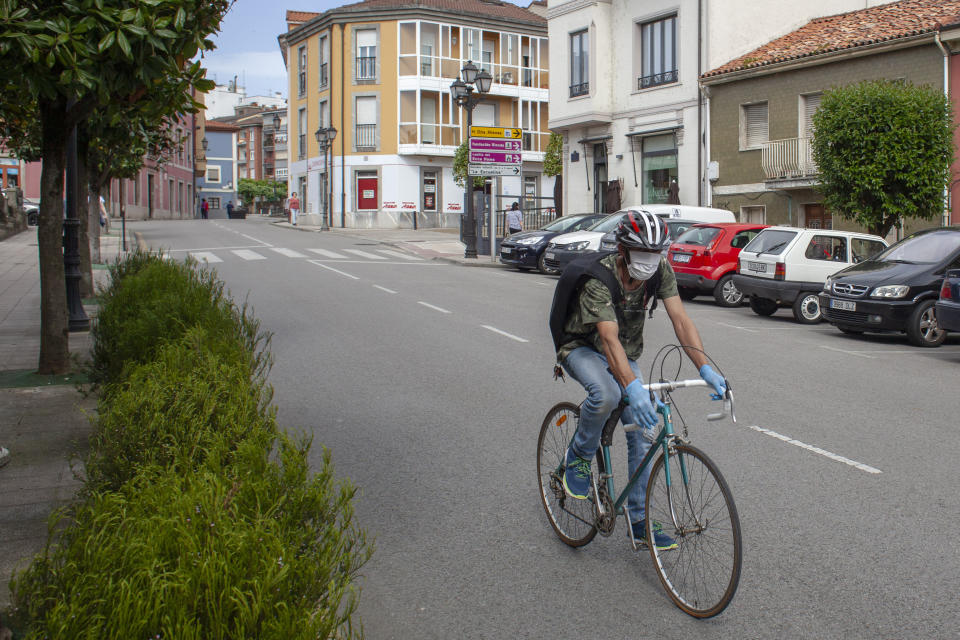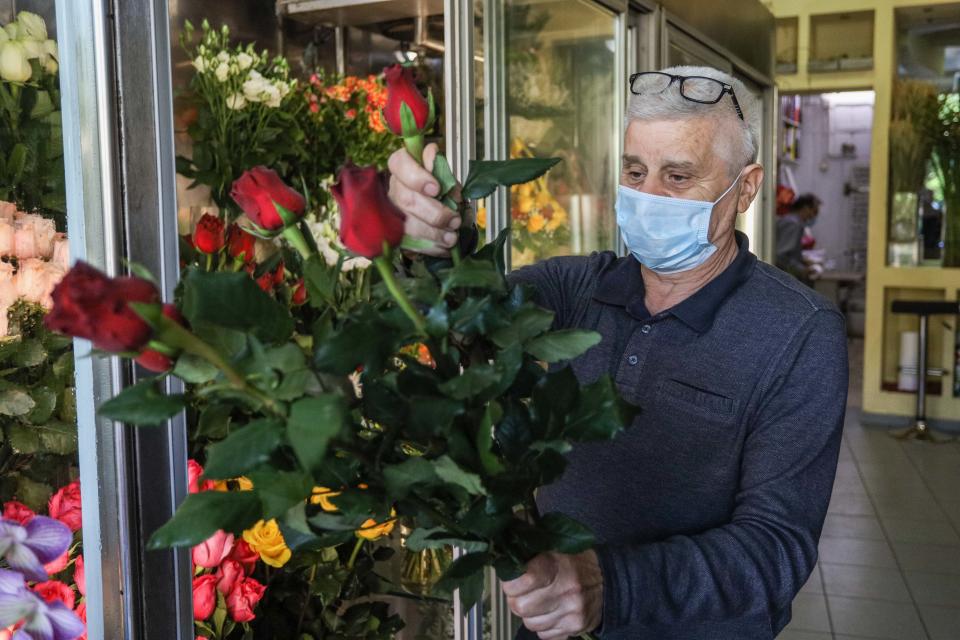'Privacy is at the heart' of the coronavirus contact-tracing app

The brains behind the coronavirus contact-tracing app have stressed privacy is “at the heart” of its development.
The free app, which will be trialled on the Isle of Wight this week, uses Bluetooth to track when users come into contact with each other.
If a user logs the tell-tale fever or cough, the app could trigger an anonymous alert to others who have been close to the “patient”, enabling them to self-isolate or seek testing.
The app aims to limit the risk of a second peak in coronavirus infections and could even help ease the UK out of lockdown.
Critics have raised concerns, however, about the government and third parties potentially having access to users’ personal data.
Early research suggests the coronavirus is mild in four out of five cases, however, it can trigger a respiratory disease called COVID-19.

‘Contact tracing will become part of our daily lives’
Experts have reassured privacy is not a concern with the contact-tracing app.
“The app is designed so you don’t have to give your personal details, just the first half of your postcode,” said Matthew Gould, CEO of NHSX.
“It doesn’t know who you are, who you’ve been near.
“It assigns random identifiers to its users.
“Your Bluetooth remembers the random identifiers of those who you’ve been near who also have the app.”
Latest coronavirus news, updates and advice
Live: Follow all the latest updates from the UK and around the world
Fact-checker: The number of COVID-19 cases in your local area
Explained: Symptoms, latest advice and how it compares to the flu
Experts have stressed the potential of the app in helping to keep the virus’ basic reproduction number, or its “R”, below one.
The R is the number of people a patient statistically goes on to infect.
For example, if the number is three, every patient is expected to pass the virus to three others.
If the basic reproduction number is less than one, the outbreak dies out.
“We’re confident the R is significantly below one,” said Professor Jonathan Van-Tam, deputy chief medical officer for England.
“We want to keep it below one as we try and ease social distancing.
“It’s very likely we will have to live with this virus to a greater or lesser extent until we find an effective vaccine.
“Contact tracing will become part of our daily lives.”
Despite the app’s potential, experts have stressed downloading it is “voluntary”.
“You choose to download it and upload data,” said Gould. “You can choose to delete it.”
It is unclear when the app may be rolled out in the rest of the UK.
Gould also stressed the app’s manufacturers have been as “transparent as they can”.
“We will open the code of the app, we will publish a privacy notice and security model,” he said.
Professor Sir Jonathan Montgomery, chair of the ethics advisory board for the app, added: “The app’s code and underlying algorithms will be made public.”

App is ‘not a panacea’
Transport secretary Grant Shapps told the BBC’s Andrew Marr Show all Britons will be asked to download the app to assist “the automation of the tracking”.
Epidemiologists advising the NHS claimed around 56% of the UK population, or 80% of smartphone owners, must use the technology to suppress the coronavirus.
During a Science Media Centre briefing, experts were reluctant to put a figure on the downloads required.
“We need a significant proportion of the population [to download the app] to give us an additional oomph in the contact-tracing space”, said Professor Van-Tam.
Gould added, however, the technology is “not a silver bullet standalone solution”.
“It’s part of a wider [contact tracing] strategy alongside the expansion of testing,” he said.
Critics have claimed the app-approach assumes everyone has a smartphone.
Professor John Newton, national coordinator of the UK coronavirus testing programme, argued: “It’s part of the package [of contact tracing], it’s not a panacea.”
The government has also promised to recruit 18,000 people to do manual contact tracing.
When it comes to the app’s success, however, experts have stressed it “depends on the level of uptake”.
“If people want to carry on saving lives, protecting the NHS and get the country back on its feet, downloading the app is one way they can do that,” said Gould.
Professor Van-Tam added: “The market research we’ve done suggests people will engage with something that protects the NHS.”
Gould stressed, however, even if downloads are not “very high”, the app could still be “fantastically valuable”.
“There isn’t a minimum [level of downloads] above which the app becomes effective,” he said.
“The more we use the app, the more insight it gives us.
“It is useful even at low levels but as levels climb, it gets more and more useful.”
In order to achieve this climb, the team are “acutely conscious we need to win the confidence of the public”.
“We have privacy at the heart of the app,” said Gould.
“We can say to the public, ‘You can really help by downloading the app and you’re not compromising your privacy by doing it’.”
When asked about the risk of hacking, Professor Montgomery said: “If you get into the database, you will not find any identifiable information about the users.”
Speaking at the briefing, the experts also stressed the app is subject to change.
“When we launch it won’t be perfect, it will definitely evolve,” said Gould.
“As our understanding of the virus changes, so will the app.”
Some have criticised the decision to make the app “centralised”.
This means data will reside on a centrally-owned database controlled by a company. This is compared to a decentralised approach where data is stored on a shared database in many locations controlled by no single entity.
The experts argued the centralised approach will allow them to better understand the coronavirus via machine learning.
“The app’s Bluetooth technology helps us understand proximity,” said Professor Van-Tam.
“We can learn if 30 minutes of exposure at close quarters to a case on day one of their symptoms is equivalent to two hours’ exposure 1.5 days before symptoms began, or three days after symptoms began when virus load is starting to decline.”
Gould added a centralised app will also allow the team to better identify “hot spots” of infection.
“Another advantage is we can see anonymous patterns if someone is trying to use this [app] for malign intent”, he said.
Other experts have largely welcomed the app, but also voiced concerns.
“The contact-tracing app could constitute the way out of the lockdown because of its potential to collect real time big health data about individuals’ current health condition,” said Dr Dimitra Petrakaki from the University of Sussex Business School.
“This is information that is difficult, if not impossible, to collect otherwise.”
Dr Petrakaki added, however, the app assumes people will accurately report their symptoms.

What is the coronavirus?
The coronavirus is one of seven strains of a virus class that are known to infect humans.
Others cause everything from the common cold to severe acute respiratory syndrome (Sars), which killed 774 people during its 2002/3 outbreak.
Since the outbreak was identified, more than 3.5 million cases have been confirmed worldwide, according to Johns Hopkins University.
Of these cases, over 1.1 million are known to have “recovered”.
Globally, the death toll has exceeded 248,100.
The coronavirus mainly spreads face to face via infected droplets expelled in a cough or sneeze.
There is also evidence it is transmitted in faeces and survives on surfaces.
The coronavirus has no “set” treatment, with most patients naturally fighting off the infection.
Those requiring hospitalisation are given “supportive care”, like ventilation, while their immune system gets to work.
Officials have urged people to ward off infection by washing their hands regularly and maintaining social distancing.



